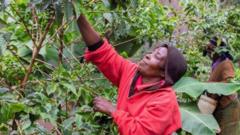In Kenya's fertile Rift Valley, coffee has been a cherished crop since the late 19th century. However, local farmers like Simon Macharia, who manage small plantations in the highlands of Komothai, find themselves grappling with an escalating crisis: climate change. Once ideal conditions for cultivating high-quality Kenya AA coffee beans are increasingly disrupted by cold spells, erratic rainfall, and rising temperatures.
Coffee is often touted as "black gold," celebrated for its rich flavors and essential role in the economy. Yet, despite its market value, the realities for those who cultivate it are stark. Many Kenyan coffee workers, such as Edita Mwangi, struggle to make ends meet, earning nominal wages that pale in comparison to the selling price of their product in European cafes. With average daily earnings of just $1.40, these laborers contend with poverty while dedicating their lives to a crop whose commercialization benefits distant markets.
The coffee growing process is labor-intensive, demanding constant attention during key stages of growth and requiring significant investment. Unfortunately, the delicate nature of coffee plants makes them particularly susceptible to changing weather conditions. John Murigi, chairperson of the Komothai Coffee Society, explains that coffee production has been declining amid increasing climate-related challenges. Farmers face both a decrease in crop yields and a rise in diseases, exacerbated by reliance on harmful pesticides to protect their crops.
As climate patterns shift, critical water sources grow scarce. Farmers like Joseph Kimani report reduced river levels, forcing them to rely on dwindling resources for irrigation. This precarious dependence further stresses the environment, and with over 23 societies in Kiambu County using significant quantities of water for coffee cultivation, the long-term sustainability of such practices raises concerns.
This phenomenon extends beyond local borders; escalating global temperatures and increased droughts are affecting coffee production worldwide. Fairtrade International’s survey indicates that a staggering 93% of Kenyan coffee farmers already feel the impact of climate change.
In response, farmers are exploring adaptive strategies, such as introducing more shade to their coffee plants. While such measures could provide some relief, the consensus among farmers is that long-term solutions must tackle both environmental and economic issues. Unfortunately, many, including Mr. Macharia, express skepticism regarding the future of coffee farming in Kenya, questioning whether their children will inherit an industry under siege.
As coffee farmers navigate the intersecting threats of climate change and economic disparity, the fate of one of Kenya's most valued agricultural exports hangs in the balance.



















